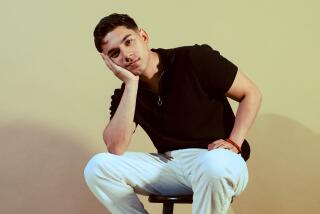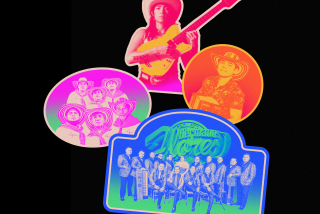A Discordant Note in Mariachi Style : Music: Traditional and contemporary performers disagree on the role of mariachi. The ‘younger’ approach to mariachi adapts to classical, pop or jazz.
The headliners of Sunday’s Mariachi USA Festival at the Hollywood Bowl are Linda Ronstadt and Vikki Carr. But beneath the star billing, the lineup of mariachi groups will represent a less glamorous but far more controversial subtext: a simmering dispute between traditional and contemporary mariachi performers.
Sunday’s listeners will have ample opportunity to make up their own minds. The first mariachi festival to be held at the Bowl and the largest mariachi festival ever held in the United States, according to promoter Rodri J. Rodriguez, the 6 p.m. concert will feature Mariachi El Sol de Mexico, Mariachi Los Camperos, Mariachi Vargas De Tecalitlan and Mariachi Los Galleros, in addition to Ronstadt and Carr.
From a visual and instrumental point of view, there’s little sign of conflict. The colorful attire, the unusual combination of trumpets, violins and guitars, the foot-tapping rhythms will be as familiar as ever. But if Jose Hernandez of Mariachi El Sol de Mexico decides to launch into his unique interpretation of “New York, New York,” the new wave of energy in the century-old music will be more than obvious.
“There’s a lot to be done yet with mariachi music,” explains Hernandez. “Others say it’s not mariachi if you do pop songs, but I don’t agree. There’s a younger crowd out there for our music now, and they want to hear younger music.”
For Hernandez, “younger music” might mean anything from singing Paul McCartney’s “Yesterday” in English to rapping in Spanish--all with mariachi accompaniment. A few weeks ago, his group did a fund-raiser with the accompaniment of a 35-piece orchestra, and they have performed with Ronstadt and Willie Nelson.
“Mariachi can adapt to classical,” says Hernandez. “It can adapt to pop or to jazz. It can adapt to any kind of music.”
Hernandez feels that traditional mariachi, as well, can be improved by a more “contemporary” approach.
“When we do traditional songs,” he explains, “I like to dress them up. I feel that when people hear the same songs played over and over again in the same arrangements, they want to hear something different. So when they listen to my group playing traditional songs, they hear a new, different arrangement.”
Hernandez’s view of mariachi will not go unchallenged in Sunday’s Bowl concert. Nati Cano, leader of Mariachi Los Camperos, approaches the music from a considerably different perspective.
“I don’t think,” says Cano, “that most of the people who are coming to the Hollywood Bowl are coming to hear pop music--or the lambada. I think they’re coming to hear traditional mariachi music.
“And what’s wrong with that? Mariachi has a treasure of music that hasn’t even been explored yet. Every little Mexican town is full of wonderful songs. You hear them every night when the people get together to make music. To me, that’s what real mariachi is all about. That’s what keeps it alive--traditional music, not pop music.”
Cano, who has led a mariachi band for 27 years, has taken his traditionally oriented groups everywhere from Mexico City and Las Vegas to Carnegie Hall and the “Tonight Show.”
He points out that contemporary techniques have been tried before with mariachi music. “Back in the ‘50s in Mexico, we sometimes added mambo and cha cha cha, just to keep working. But that wasn’t real mariachi.”
Mariachi variations have also surfaced in American pop music from time to time--with considerable commercial success in the case of Herb Alpert’s Tijuana Brass. Other aspects of the style have been used--generally with atmospheric intent--by the Amazing Rhythm Aces (“Third Rate Romance, Low Rent Rendezvous”), Maria Muldaur (“Say You Will”) and Hoyt Axton (“The No No Song”).
“We all want to please our audiences 100%, of course,” Cano explains. “But sometimes it’s a mistake to try to please everybody. Once, when we were playing in Las Vegas, we sang something in English. Some people came up after the show and said, ‘Don’t do that. If we want to hear American songs, we’ll go see another show. We came to hear your music.’ ”
Hernandez, born and bred in Los Angeles, feels that his contemporary mariachi is precisely that--his music. Like Cano and many other mariachi leaders, he comes from a long line of mariachi musicians. But his own training has been far more extensive than the usual father-to-son assimilation of songs, music and lore.
“I grew up in L.A.,” he says. “I played in the high school marching band and the jazz band. After I graduated I studied film scoring, composing and arranging. A lot of that background has influenced my music, and I guess that’s why my ideas are a little more on the modern side.
“Traditional mariachi is fine,” Hernandez concludes. “But this approach feels natural to me--and my group is me. I’m not adding all these contemporary elements just to attract a lot of attention. I do it because I feel it’s what’s right for mariachi. To me, there’s no limit to what mariachi can do.”
“There’s nothing wrong with modern music,” counters Cano. “But it’s not for mariachi. We can make it better, and we should. But we shouldn’t lose the traditional values when we do it. The success of Linda Ronstadt’s mariachi tour--which was very traditional--proves that the old music is still very much alive.”
More to Read
The biggest entertainment stories
Get our big stories about Hollywood, film, television, music, arts, culture and more right in your inbox as soon as they publish.
You may occasionally receive promotional content from the Los Angeles Times.










